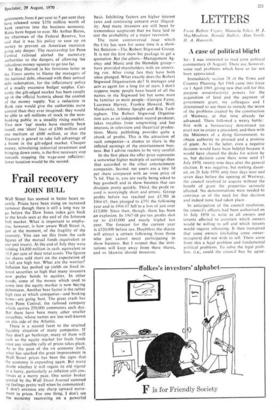Frail recovery
JOHN BULL
Wall Street has seemed in better heart re- cently. Prices have been rising on increased turnover though there is still a long way to go before the Dow Jones index gets back to the levels seen at the end of the Johnson bull market. What is important to empha- sise, however, is how aware Wall Street is, just at the moment, of the fragility of the recovery. You can see this from the cash figures of the mutual funds.(equivalent to our unit trusts). At the end of July they were holding $4,800 million in cash, equivalent to 11.8 per cent of their total assets. The figures for shares sold short on the expectation of a fall are high too. What are the worries? Inflation has pushed up yields on fixed in- terest securities so high that many investors now prefer bonds to equities. In other words, some of the money which used to come into the equity market is now haying debentures. Another bear factor is the rather high rate at which companies—and broking firms—are going bust. The great crash has been Penn Central, the railroad company which carries 250,000 commuters each day. But there have been many other smaller casualties, whose names are less well-known on this side of the Atlantic.
There is a second facet to the strained liquidity situation of many companies. If they don't go bankrupt, many of them will rush to the equity market for fresh funds once any sizeable rally of prices takes place. As to the pace of the us economy itself, what has sparked the great improvement in Wall Street prices has been the signs that the economy is expanding again. But many doubt whether it will regain its old vigour in a hurry, particularly as inflation still con, tmues at a merry pace. One senior broker quoted by the Wall Street Journal summed up feelings pretty well when he commented: I don't envision any sharp upward move- ment in prices. For one thing, I don't see the economy recovering on a powerful
basis. Inhibiting factors are higher interest rates and continuing concern over illiquid- ity. And many investors are still beset by tremendous scepticism that we have laid to rest the probability of a major recession.
The most controversial issue which the City has seen for some time is a show-
biz flotation—The Robert Stigwood Group. It is not the first show-biz package to get a quotation. But the others—Management Ag- ency and Music and the Hemdale group—
have provided -shareholders with an unnerv- ing run. After rising fast they have both since plunged. What exactly does the Robert Stigwood Organisation do? It manages and acts as agent for a long list of stars. 1 don't suppose many people have heard of all the names in the Stigwood list but some must be familiar to most people—Georgie Fame, Laurence Harvey, Frankie Howerd, Wolf Mankowitz, Johnny Speight and Rita Tush- ingham. The Robert Stigwood Organisa- tion acts as an independent record producer, takes royalties from songwriting and has interests in television and theatrical produc- tions. Music publishing provides quite a chunk of profits. This is the attraction of such companies—a chance to share in the inflated earnings of the entertainment busi- ness. But I advise readers to be very careful.
In the first place the offer price represents a somewhat higher multiple of earnings than that accorded to the other entertainment companies. Second. net assets are a tiny 3d per share compared with an issue price of 7s 6d. That is, you are really being asked to buy goodwill and in show business that can dissipate pretty quickly. Third, the profit re- cord is worryingly short and erratic. Group
profits before tax reached just £5,703 in 1964-65, then plunged to £751 the following
year and in 1966-67 fell to a loss of just over £12,000. Since then, though, there has been an explosion. In 1967-68 pre-tax profits shot up to £143,000 and nearly tripled last year. The forecast for the current year is £520,000 before tax. Doubtless the shares
will attract a certain following from those who just cannot resist participating in
show business. But I suspect that the insti- tutions will keep away from these shares, and so likewise should investors.
ffolkes's investors' alphabet
F is for Friendly Society






























 Previous page
Previous page